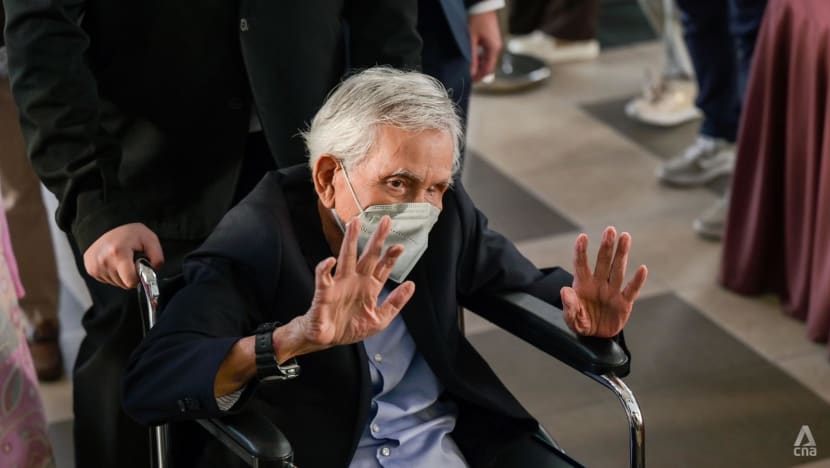Commentary: Former Malaysia finance minister Daim Zainuddin shows how political legacies outlast controversy
The death of former Malaysia finance minister Daim Zainuddin saw a rush of reverential tributes, despite corruption allegations against him, says Sophie Lemiere, a political anthropologist who specialises in Malaysian politics.

Daim Zainuddin is seen in a wheelchair at the Kuala Lumpur Courts Complex on Jan 29, 2024. (Photo: CNA/Fadza Ishak)

This audio is generated by an AI tool.
KUALA LUMPUR: In the annals of political history, few can boast the ability to weather controversy as effectively as Malaysia’s former finance minister Daim Zainuddin.
The recent flood of positive obituaries for Daim after his death - acclaiming him as a key architect of Malaysia’s economic success during the 1980s and 1990s - offers a poignant example of how controversy can fade in the face of a larger, indelible political legacy.
His legacy, as well as that of his longtime ally and friend Mahathir Mohamad, is shaped by decades of power struggles, political manoeuvring and complex personal dynamics.
Both men have come to embody the paradox of Malaysian politics: Towering figures who have at times been defined by allegations of corruption and abuse of power, but whose contributions to the country's development are undeniable.
Daim served as Mahathir’s finance minister during the latter’s first tenure as prime minister from 1984 to 1991. His policies to liberalise Malaysia’s economy and attract foreign investment led to record growth.
He served as finance minister again after the dismissal of Anwar Ibrahim from 1998 to 2001, helping Malaysia weather the aftershocks of the Asian financial crisis.
However, Daim recently came under scrutiny in an anti-graft probe led by Prime Minister Anwar Ibrahim’s government. He was charged in January for failing to declare assets such as companies, properties and luxury cars.
Yet Daim's death saw a rush of reverential tributes to his role in transforming Malaysia into one of Southeast Asia's economic powerhouses. This outpouring of positive sentiment undercut the graft charges, which some see as an effort by Anwar to tarnish his reputation.
Following his death, a Malaysian court acquitted Daim on Wednesday (Nov 20), as the prosecution no longer wanted to pursue the case.
A POLITICAL WEAPON
In Malaysia, as in many parts of the world, corruption allegations have frequently been employed as a political weapon, regardless of their veracity. The goal is to discredit, to create doubt in the public’s mind, and to slowly erode a person’s influence.
However, history has repeatedly shown that this approach can be counterproductive. Public shaming - particularly in a country where corruption is often seen as systemic - does little to create lasting moral or political consequences.
In Malaysia, where many powerful figures have long been entangled in corruption, the accusations seem to lose their power, reduced to mere political theatre.
Moreover, the effectiveness of public shaming in discrediting powerful leaders is dubious, as it often proves futile in the face of enduring popular support or historical significance. The allegations are no longer seen as shocking but as part of the rough-and-tumble of the political game.
This phenomenon is not unique to Malaysia. In Brazil, former president Luiz Inacio Lula da Silva faced years of corruption accusations that led to his imprisonment in 2017.
However, the charges, widely seen as politically motivated, did not tarnish his legacy. Upon his release, Lula staged a stunning political comeback, returning to the political spotlight and eventually winning the presidency again in 2022.
Before Lula, in 2018, Mahathir Mohamad made a historic return to power, winning election on a platform of democratic reform and ending a 61-year dominance by the party he had once led. This shift came despite his autocratic style of leadership during his 22-year tenure as prime minister.
These leaders illustrate how accusations of corruption, and abuse of power, can, in certain circumstances, fuel a leader’s political resurrection. In the end, rather than being a permanent stain on his reputation, Lula’s persecution only seemed to galvanise his supporters, who, like many other observers, viewed him as a victim of a political vendetta.
CONTROVERSIAL LEADERS ARE TIED TO THEIR COUNTRY’S HISTORY
The lesson here is clear: Political icons, no matter how controversial, tend to transcend the momentary political conflicts that threaten to dismantle their legacies. Their fate is often intrinsically tied to the history of their countries, and attempting to erase them is akin to erasing a vital part of that history.
Their political rise and fall - whether in moments of triumph or scandal - become enmeshed in the broader story of a nation’s journey. Controversial leaders often find themselves, paradoxically, more resilient than their critics anticipate.
In this light, Prime Minister Anwar Ibrahim, Malaysia’s current leader, should take heed. Like his predecessors, Anwar’s legacy will undoubtedly be shaped by both his successes and his controversies.
Having spent his political career as both an ally and adversary to Daim and Mahathir, Anwar is no stranger to the complexities of power and the accusations that often come with it. And many argue his old grudges would be the origins of the political vendetta at play against the two old leaders.
Anwar’s own rise to the premiership, after years of political exile and struggle, mirrors the resilience of figures like Daim and Mahathir. The accusations that have been levelled against him in the past - whether related to corruption, abuse of power or sexual violence - will remain part of the public discourse, but so too will his accomplishments.
Whether through controversy or triumph, Anwar’s legacy - like that of Daim and Mahathir - will be defined not just by his mistakes, but by the larger role he played in Malaysia’s political and economic evolution. Just as the corruption accusations never erased the reputations of leaders like Daim and Mahathir, so too will Anwar's most contentious moments fade.
In the end, what history chooses to remember is often beyond the reach of the political games of the present.
Dr Sophie Lemiere is a political anthropologist who specialises in Malaysian politics, and has held research and teaching positions in major universities across Europe, the United States and Southeast Asia. She is currently Adjunct Fellow at the Center for Strategic and International Studies, a Washington-based think tank, as well as Research Fellow at College de France in Paris. She is the founder of SoCO, a political consulting firm in Kuala Lumpur.


















